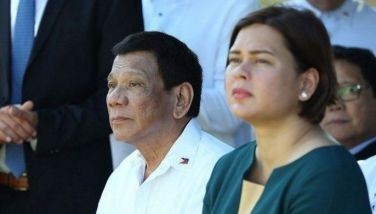PCGG commissioners face Senate, but...
December 5, 2006 | 12:00am
Commissioners of the Presidential Commission on Good Government (PCGG) finally appeared before the Senate after losing a legal battle with the Senate before the Supreme Court.
Commissioners Ricardo Abcede, Nicasio Conti, Tereso Javier and Narciso Nario joined PCGG Chairman Camilo Sabio for the first time yesterday at the Senate inquiry into the allegedly anomalous losses incurred by the Philippine Overseas Telecommunications Corp., the Philippine Communications Satellite Corp. (Philcomsat) and the Philcomsat Holdings Corp.
However, instead of shedding light on the issues surrounding the three interrelated companies, the PCGG was criticized by the Senate for being in apparent disarray.
Senate committee on government corporations and public enterprises chairman Richard Gordon expressed disappointment over what he described as Sabio’s evasiveness when Sabio was questioned on issues regarding the companies in question, as well as the other holdings of the PCGG.
The PCGG was also criticized for "finger-pointing" among themselves and for appearing to take different positions on how to handle these companies.
During the hearing, it was revealed by Conti that he headed a study group to look into the issues surrounding the three companies in August 2005 and that its recommendations were submitted to the PCGG en banc in March this year.
Conti disclosed that the recommendations made by the study group include the PCGG moving to resolve conflicts among two factions within the companies by reconciling their claims, that the Commission should assert itself in all efforts for a peaceful resolution and that a due diligence audit of the three companies be conducted by an external auditor.
However, Conti said the recommendations were not acted upon by the asset management department of the PCGG headed by Abcede since April.
Abcede said there were efforts to come up with a "unity board" composed of the warring factions of Victor Africa and Manuel Nieto, but this has yet to materialize.
On the audit of the three companies, Abcede said the Africa group refused to push through with the audit, a statement disputed by Africa.
According to Africa, the problem was that there was no party who agreed to shoulder the bill for the audit.
The Africa group also blamed the PCGG for coming up with a "fictitious" claim of 53 percent control of the companies when, in fact, the PCGG held only 35 percent.
Gordon said that he believes the companies should already be privatized in order to halt the alleged dissipation of their assets.
Commissioners Ricardo Abcede, Nicasio Conti, Tereso Javier and Narciso Nario joined PCGG Chairman Camilo Sabio for the first time yesterday at the Senate inquiry into the allegedly anomalous losses incurred by the Philippine Overseas Telecommunications Corp., the Philippine Communications Satellite Corp. (Philcomsat) and the Philcomsat Holdings Corp.
However, instead of shedding light on the issues surrounding the three interrelated companies, the PCGG was criticized by the Senate for being in apparent disarray.
Senate committee on government corporations and public enterprises chairman Richard Gordon expressed disappointment over what he described as Sabio’s evasiveness when Sabio was questioned on issues regarding the companies in question, as well as the other holdings of the PCGG.
The PCGG was also criticized for "finger-pointing" among themselves and for appearing to take different positions on how to handle these companies.
During the hearing, it was revealed by Conti that he headed a study group to look into the issues surrounding the three companies in August 2005 and that its recommendations were submitted to the PCGG en banc in March this year.
Conti disclosed that the recommendations made by the study group include the PCGG moving to resolve conflicts among two factions within the companies by reconciling their claims, that the Commission should assert itself in all efforts for a peaceful resolution and that a due diligence audit of the three companies be conducted by an external auditor.
However, Conti said the recommendations were not acted upon by the asset management department of the PCGG headed by Abcede since April.
Abcede said there were efforts to come up with a "unity board" composed of the warring factions of Victor Africa and Manuel Nieto, but this has yet to materialize.
On the audit of the three companies, Abcede said the Africa group refused to push through with the audit, a statement disputed by Africa.
According to Africa, the problem was that there was no party who agreed to shoulder the bill for the audit.
The Africa group also blamed the PCGG for coming up with a "fictitious" claim of 53 percent control of the companies when, in fact, the PCGG held only 35 percent.
Gordon said that he believes the companies should already be privatized in order to halt the alleged dissipation of their assets.
BrandSpace Articles
<
>
- Latest
- Trending
Trending
Latest
Trending
Latest
Recommended
































